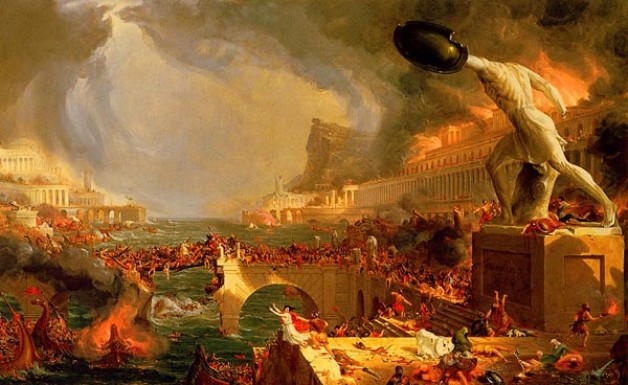The peoples of many ages have operated under the impression that things have never been worse. As attractive as is the Enlightenment notion that the world is driven along in a sort of automatic progressive march, every age has had its fair share of gainsayers. In the current political and cultural climate, and with the attendant loss of footing in the culture war, the temptation to declare a low point appears as strong as ever. The obstacles appear insuperable, the opponent indefatigable, the confusion ubiquitous. Some have begun to ask, perhaps overdramatically, “Has the death knell sounded for the Catholic Church?” And yet, a look back on history can disabuse us of such sweepingly ominous prophecies. To this end, we’ll consult the perennial wisdom of G. K. Chesterton.
In The Everlasting Man, Chesterton devotes a chapter to “The Five Deaths of the Faith.” By his reckoning, there were five points in history when the Church appeared, from all outward indications, to be dead: the Arian heresy, the Albigensian heresy, Humanist skepticism, the age of Enlightenment, and the age of scientific optimism in the wake of Darwin. At each stage, if we were to judge the Church’s position by the same standards as its terrestrial counterparts, it ought to have died. In a certain sense, one might argue, it did, but death had not the final word:
Christendom has had a series of revolutions and in each one of them Christianity has died. Christianity has died many times and risen again; for it had a God who knew the way out of the grave.
Arianism is a typical example of the paradoxically recurring resurrection narrative that frames the history of Christianity. It had all the “appeal of a simplification.” In an attempt to safeguard the unity and transcendence of God, half of Christendom espoused a theological reduction. Its cause was advanced by the emperor, its bishops gained ascendency, and its opponents faced exile (up to five times in the case of St. Athanasius); “the whole world groaned and marveled to find itself Arian” (St. Jerome). And then, seemingly against all odds, Christianity arose in triumph. And the theme resurfaces time and time again:
[T]he first extraordinary fact which marks this history is this: that Europe has been turned upside down over and over again; and that at the end of each of these revolutions the same religion has again been found on top.
The fact is that the Church does not behave like any other institution for the simple reason that it is divine: coming forth from Christ’s side on the cross and plotting its course back to Him in heaven. The Church is thereby endowed with a divine purpose and a divine resiliency. It is possessed of what Chesterton calls “the character of a unique thing and even of a supernatural thing.” Furthermore, there is the testimony of Christ; He has promised to be faithful to His Mystical Body: “Heaven and earth shall pass away, but my words shall not pass away.” Consequently, the Church, as the prolongation of Christ’s mystery on earth, is not subject to the same laws as are institutions of a purely human origin. And so, while kingdoms and empires rise and fall around her, the Church continues to chart a providential course through the ages.
As a result, a member of this peculiar Mystical Body possesses hope of an entirely different order. With a divine charter, a divine trajectory, and a divine kingship, the Church appears to every age as a sign of contradiction. To those without, she is a puzzle and a surprise, but to those within she offers the comfort of the Ark. For this reason, Chesterton, with overwhelming historical justification, is able to utter a bold prophecy:
If our social relations and records retain their continuity, if men really learn to apply reason to the accumulating facts of so crushing a story, it would seem that sooner or later even its enemies will learn from their incessant and interminable disappointments not to look for anything so simple as its death. They may continue to war with it, but it will be as they war with nature; as they war with the landscape, as they war with the skies. “Heaven and earth shall pass away, but my words shall not pass away.”
✠
Image: Thomas Cole, Destruction







